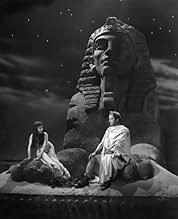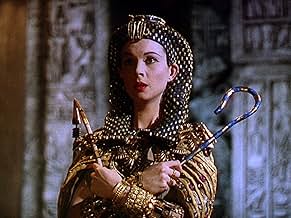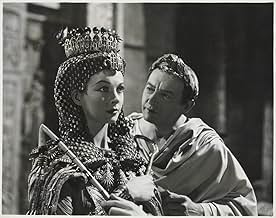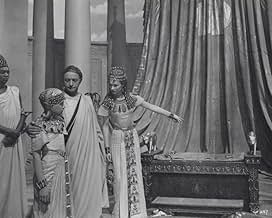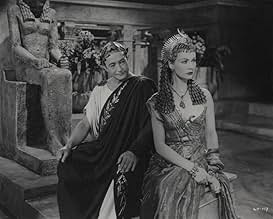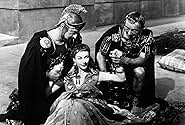PUNTUACIÓN EN IMDb
6,2/10
3,3 mil
TU PUNTUACIÓN
En el apogeo de la Guerra Civil Romana, una joven Cleopatra conoce a un Julio César de mediana edad, quien le enseña cómo gobernar Egipto.En el apogeo de la Guerra Civil Romana, una joven Cleopatra conoce a un Julio César de mediana edad, quien le enseña cómo gobernar Egipto.En el apogeo de la Guerra Civil Romana, una joven Cleopatra conoce a un Julio César de mediana edad, quien le enseña cómo gobernar Egipto.
- Dirección
- Guión
- Reparto principal
- Nominado para 1 premio Óscar
- 2 nominaciones en total
Anthony Eustrel
- Achillas
- (as Antony Eustrel)
James McKechnie
- 2nd. Centurion
- (as James Mc Kechnie)
Reseñas destacadas
Impressive acting is the highlight of 1945's "Caesar and Cleopatra," a British production starring Vivien Leigh, Claude Rains, Stewart Granger, Flora Robson and Francis L. Sullivan. In smaller roles, you can spot Michael Rennie, Kay Kendall and Jean Simmons.
This production was not without its problems - made during World War II, bombings often delayed the filming; there was a five-week break while Vivien Leigh recovered from a miscarriage; and there was a shortage of materials to build the sets. Nevertheless, for a British film, this is a real spectacle and made in color, which was also unusual back then.
Shaw's Cleopatra (Leigh) is a childlike girl/woman who has hitting matches with her younger brother, runs, giggles, talks fast and becomes nervous at the thought of meeting the great Caesar (Rains). In the beginning, she meets him without realizing it.
The two have a flirtation while he teaches her how to be a queen. Shaw's Caesar is an old man, a great warrior and a benevolent ruler who rules with a velvet glove rather than a sword.
Rains and Leigh are wonderful in their roles. Rains, as someone stated, with his Caesar haircut, weary face and beautiful profile looks as if he stepped out of that time period. His mastery of Shaw's language is magnificent, and he really holds the film together.
The stunningly beautiful Leigh, white-faced with glorious cheekbones and dazzling eyes, is a whimsical Cleopatra at first. She matures and becomes calmer and more regal as she learns how to be a queen, but she falls back into her childish ways in the presence of Caesar, particularly when he promises to send her Marc Anthony.
They say the camera adds 10 pounds - frankly, I'm surprised any of the actors could see Leigh, she is so tiny. She gives a sprightly, energetic performance.
Shaw's Cleopatra is 16 (though in reality she is 20 or 21) - Leigh was 32 at the time of filming and comes off like the teenager Shaw wrote.
Stewart Granger as Apollodorus shows off his very hunky physique - no wonder he came to the attention of Hollywood. As two aides of Caesar's, Basil Sydney as Ruffio and Cecil Parker as Britanus give fine performances.
Finally, Flora Robson as the protective, tough nursemaid of Cleopatra's, Ftatateeta, sinks her teeth into the role and is a force to contend with.
This movie flopped, probably because audiences thought it was going to be some huge spectacle - it's big for England, but it's not DeMille.
Still, it's a real treat to see one of the classics done by two great actors who were well-trained and well-equipped to perform George Bernard Shaw.
This production was not without its problems - made during World War II, bombings often delayed the filming; there was a five-week break while Vivien Leigh recovered from a miscarriage; and there was a shortage of materials to build the sets. Nevertheless, for a British film, this is a real spectacle and made in color, which was also unusual back then.
Shaw's Cleopatra (Leigh) is a childlike girl/woman who has hitting matches with her younger brother, runs, giggles, talks fast and becomes nervous at the thought of meeting the great Caesar (Rains). In the beginning, she meets him without realizing it.
The two have a flirtation while he teaches her how to be a queen. Shaw's Caesar is an old man, a great warrior and a benevolent ruler who rules with a velvet glove rather than a sword.
Rains and Leigh are wonderful in their roles. Rains, as someone stated, with his Caesar haircut, weary face and beautiful profile looks as if he stepped out of that time period. His mastery of Shaw's language is magnificent, and he really holds the film together.
The stunningly beautiful Leigh, white-faced with glorious cheekbones and dazzling eyes, is a whimsical Cleopatra at first. She matures and becomes calmer and more regal as she learns how to be a queen, but she falls back into her childish ways in the presence of Caesar, particularly when he promises to send her Marc Anthony.
They say the camera adds 10 pounds - frankly, I'm surprised any of the actors could see Leigh, she is so tiny. She gives a sprightly, energetic performance.
Shaw's Cleopatra is 16 (though in reality she is 20 or 21) - Leigh was 32 at the time of filming and comes off like the teenager Shaw wrote.
Stewart Granger as Apollodorus shows off his very hunky physique - no wonder he came to the attention of Hollywood. As two aides of Caesar's, Basil Sydney as Ruffio and Cecil Parker as Britanus give fine performances.
Finally, Flora Robson as the protective, tough nursemaid of Cleopatra's, Ftatateeta, sinks her teeth into the role and is a force to contend with.
This movie flopped, probably because audiences thought it was going to be some huge spectacle - it's big for England, but it's not DeMille.
Still, it's a real treat to see one of the classics done by two great actors who were well-trained and well-equipped to perform George Bernard Shaw.
Shaw was a wonderful historian with a deadly eye for irony. Claude Rains brings off Caesar with withering poise and breezy wit, standing tall above the flashing eye of an Egyptian hurricane named Cleopatra (Vivien Leigh). Caesar's aide-de-camp is an affable bear of a man named Rufio (Basil Sydney), who mainly just keeps his eye on Caesar. Cleopatra is likewise sheltered by her scheming counselor Ftatateeta (Flora Robson), a name that not even Caesar can pronounce. Character actor Cecil Parker as Britannus adds quaintness and serendipity to an already splendid alchemy of spotty characters. The film moves by turns through a narrow skein of classical history as the reliquarian Egyptian world gives way to a streamlined Roman one. Along the way, we witness the contending parties encompassed and entangled in a delightful pantheon of wit, irony, satire, morals, manners, and adventure. Overall, a tremendously facile projection of one of England's sharpest satirical voices, G.B. Shaw.
Bernard Shaw does not perhaps adapt too well to the screen, but, in my opinion, this adaptation is particularly successful and probably the best of them all, although one video edition in the UK didn't even risk mentioning Shaw's name anywhere on the box, prefering to market it as mere exotic spectacle. It is of course all that, but as with everything Shaw wrote, much, much more, and is essentially about IDEAS, (not necessarily, as has often been contended, always Shaw's own personal convictions). Vivien Leigh as Cleopatra gives yet another sublime and first-rate performance as she progresses from frightened teenager to an imperious Queen with a real understanding of power. (The scene in which she whips a hapless slave in order to experience the "thrill" of total power, strangely pre-echoes the psychology of the much misunderstood SALO). Mention too must also be made of the superb musical score by Georges Auric, and admiration expressed for the sheer audacity of producer Pascal for making such a lavish and expensive production in poverty-stricken post-war Britain. Well worth watching.
CAESAR AND CLEOPATRA (1945), based on George Bernard Shaw's play and directed by Gabriel Pascal, is a very unique movie that combines all precious aspects of film art. It is not purely a historical movie since it contains a lot of inaccuracies that appear to be illogical from a historical perspective. Nevertheless, one has to analyze it in a deeper understanding, taking into account other factors that make the film a precious piece of post-war cinema. Therefore, it is impossible to see it without the consideration of other aspects, or more clearly, other figures that significantly affect the movie in general: George Bernard Shaw with his style filled with wit and elegance; and Vivien Leigh with her extraordinary acting skills. Let me consider the three aforementioned aspects: history, Shaw and Leigh.
HISTORY: It is true that if you know Cleopatra's story and the events connected with the Roman conquest over Egypt, you will feel confused or even disappointed with the content of this film. Cleopatra definitely did not learn to be a queen from Caesar that much as she does here. She was a very intelligent woman with "foxy" plans as for Caesar and Rome(in this case, I would recommend CLEOPATRA by DeMille (1934) or by Mankiewicz (1963). The film by Pascal presents, in part justifiably, a total mess in Egypt that Caesar finds when he steps into its politics. This is proved by the way Cleopatra and her brother Ptolemy are showed - two kids rather than rulers who compete for power. However, there are some strong historical points in the film that must be seen together with shortcomings. First, the film very well presents the Romans together with their leader Julius Caesar wonderfully played by Claude Rains. There is a very realistic scene of Roman legions entering Alexandria, the capital of Egypt. I also liked the way Caesar's personality is developed - someone who is full of contradictions rather than an "almighty" conqueror. These aspects make the film more authentic and ancient heroes more humane. However, it cannot be treated as a historical work for sure.
GEORGE BERNARD SHAW: But all must be thanked not only to the director but to this great classic playwright. G.B. Shaw is noticeable throughout, particularly through magnificent elegance. The director, Gabriel Pascal, really retains everything that one can find in Shaw's play. Therefore, any Shaw's fan, including the one with richest imagination will not be disappointed thanks to the marvelous elegance in this movie. In other words, the pictures of the film will not leave anything else to wish. The lavish sets, the costumes, simply BEAUTY noticeable in most of the scenes! Wit is another aspect. This is most effective in the scenes with Caesar and Cleopatra. "You will soon learn how to govern" says Cleopatra to mighty Caesar after a day or two of his lessons of ruling. Or the jumps into the sea (Apollodorus, Caesar and .... Cleopatra) - quite unique!
VIVIEN LEIGH: Before seeing the film, I did not expect her to be as good as her Scarlett O'Hara in GONE WITH THE WIND (1939). Now I must say that she is better as Cleopatra. Vivien gives a marvelous performance as a girl dreaming of a handsome man with strong arms who could protect her, and as a girl who later changes into a courageous, mighty queen. "If one man in all Alexandria can be found to say I did wrong, I swear to have myself be crucified on the door of the palace by my own slaves," which she says to Caesar after ordering Pothinus to be killed. And how wonderfully she plays one of the first scenes when she, in very unpredictable circumstances, finds out that the stranger she met at the Sphynx and with whom she talked so trust-worthily, is Caesar himself. UNFORGETTABLE! A lot of people associate only Liz Taylor with film Cleopatra. Not to mention Claudette Colbert, it is a pity they don't find Leigh's performance as worth highest attention.
It would be unfair to skip one more factor: other cast. Vivien shines in her role but others do very good jobs as well. Claude Rains is a very different Caesar than in most other films (actors who played him were, among others, Rex Harrison, William Warren, Fritz Leibner). But he is unforgettable, his face reflects a spirit of antiquity. Flora Robson who gives a memorable performance of Cleopatra's bossy servant Ftatateeta, stresses rather male features of character. She does it wonderfully through her gestures and low voice. And Francis L Sullivan as Pothinus - really worth attention!
All in all, there are many other aspects that make the movie highly recommended. Of course, it is difficult to mention everything in one review. All I can say at the end of my review is:
Do see the film!
If you are Shaw's fan, you will find his spirit throughout.
If you are Vivien Leigh's fan, you will be absolutely amazed by her performance.
If you are fond of historical, lavish epics, there will definitely be something wonderful that you will appreciate in CAESAR AND CLEOPATRA. 8/10!
HISTORY: It is true that if you know Cleopatra's story and the events connected with the Roman conquest over Egypt, you will feel confused or even disappointed with the content of this film. Cleopatra definitely did not learn to be a queen from Caesar that much as she does here. She was a very intelligent woman with "foxy" plans as for Caesar and Rome(in this case, I would recommend CLEOPATRA by DeMille (1934) or by Mankiewicz (1963). The film by Pascal presents, in part justifiably, a total mess in Egypt that Caesar finds when he steps into its politics. This is proved by the way Cleopatra and her brother Ptolemy are showed - two kids rather than rulers who compete for power. However, there are some strong historical points in the film that must be seen together with shortcomings. First, the film very well presents the Romans together with their leader Julius Caesar wonderfully played by Claude Rains. There is a very realistic scene of Roman legions entering Alexandria, the capital of Egypt. I also liked the way Caesar's personality is developed - someone who is full of contradictions rather than an "almighty" conqueror. These aspects make the film more authentic and ancient heroes more humane. However, it cannot be treated as a historical work for sure.
GEORGE BERNARD SHAW: But all must be thanked not only to the director but to this great classic playwright. G.B. Shaw is noticeable throughout, particularly through magnificent elegance. The director, Gabriel Pascal, really retains everything that one can find in Shaw's play. Therefore, any Shaw's fan, including the one with richest imagination will not be disappointed thanks to the marvelous elegance in this movie. In other words, the pictures of the film will not leave anything else to wish. The lavish sets, the costumes, simply BEAUTY noticeable in most of the scenes! Wit is another aspect. This is most effective in the scenes with Caesar and Cleopatra. "You will soon learn how to govern" says Cleopatra to mighty Caesar after a day or two of his lessons of ruling. Or the jumps into the sea (Apollodorus, Caesar and .... Cleopatra) - quite unique!
VIVIEN LEIGH: Before seeing the film, I did not expect her to be as good as her Scarlett O'Hara in GONE WITH THE WIND (1939). Now I must say that she is better as Cleopatra. Vivien gives a marvelous performance as a girl dreaming of a handsome man with strong arms who could protect her, and as a girl who later changes into a courageous, mighty queen. "If one man in all Alexandria can be found to say I did wrong, I swear to have myself be crucified on the door of the palace by my own slaves," which she says to Caesar after ordering Pothinus to be killed. And how wonderfully she plays one of the first scenes when she, in very unpredictable circumstances, finds out that the stranger she met at the Sphynx and with whom she talked so trust-worthily, is Caesar himself. UNFORGETTABLE! A lot of people associate only Liz Taylor with film Cleopatra. Not to mention Claudette Colbert, it is a pity they don't find Leigh's performance as worth highest attention.
It would be unfair to skip one more factor: other cast. Vivien shines in her role but others do very good jobs as well. Claude Rains is a very different Caesar than in most other films (actors who played him were, among others, Rex Harrison, William Warren, Fritz Leibner). But he is unforgettable, his face reflects a spirit of antiquity. Flora Robson who gives a memorable performance of Cleopatra's bossy servant Ftatateeta, stresses rather male features of character. She does it wonderfully through her gestures and low voice. And Francis L Sullivan as Pothinus - really worth attention!
All in all, there are many other aspects that make the movie highly recommended. Of course, it is difficult to mention everything in one review. All I can say at the end of my review is:
Do see the film!
If you are Shaw's fan, you will find his spirit throughout.
If you are Vivien Leigh's fan, you will be absolutely amazed by her performance.
If you are fond of historical, lavish epics, there will definitely be something wonderful that you will appreciate in CAESAR AND CLEOPATRA. 8/10!
Enjoyed seeing this great film classic from the Year 1945 with a fantastic cast of great veteran actors and stars who were just starting their careers. Claude Rains played the role as Julius Caesar who in this film was a wise old fox who is very forgiving for many reasons and stumbles upon Cleopatra, (Viven Leigh) in the desert and she does not know that he is Julius Caesar. Caesar charms Cleopatra and they become good friends, and Caesar teaches her how to rule her country of Egypt and tries to solve her problems with her servants and mostly her brother who wants to be king and ruler. There is plenty of comedy in this film which surprised me, because I had no idea it is really a film loaded with funny scenes and excellent acting by the entire cast. Stewart Granger gave a great supporting role along with Michael Rennie. If you look close you will see Jean Simmons playing as a harpist who later on in real life married Stewart Granger. Lots of fun to view this film from the past. Enjoy
¿Sabías que...?
- CuriosidadesClaude Rains made history by being the first actor to receive a salary of US$1,000,000 for his portrayal of Julius Caesar.
- PifiasCaesar refers to his nose as "rather long" and "a Roman nose," but the idea of a "Roman nose" was not introduced until almost 150 years later, when the Emperor Hadrian erected statues of his favorite, Antinous, throughout the Empire (where many of the people had never seen a Roman), and Antinous's long nose was taken as typical of Romans (even though Antinous was a Greek).
- Citas
Julius Caesar: And so to the end of history, murder shall breed murder, always in the name of right, and justice, and peace, until the gods create a race of men that can understand.
- Créditos adicionalesClosing credits cast list finishes with And The Crowd.
- ConexionesFeatured in Great Performances: Laurence Olivier: A Life (1983)
Selecciones populares
Inicia sesión para calificar y añadir a tu lista para recibir recomendaciones personalizadas
- How long is Caesar and Cleopatra?Con tecnología de Alexa
Detalles
- Fecha de lanzamiento
- País de origen
- Idioma
- Títulos en diferentes países
- Cèsar i Cleòpatra
- Localizaciones del rodaje
- Empresas productoras
- Ver más compañías en los créditos en IMDbPro
Taquilla
- Presupuesto
- 1.278.000 GBP (estimación)
- Duración
- 2h 18min(138 min)
- Relación de aspecto
- 1.37 : 1
Contribuir a esta página
Sugerir un cambio o añadir el contenido que falta


